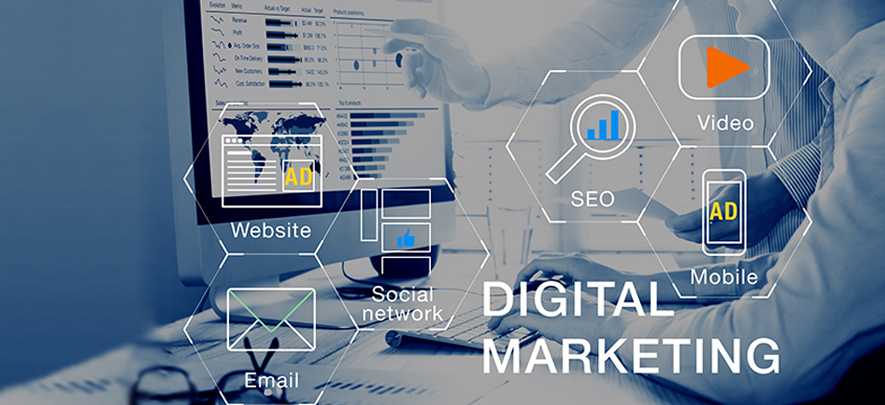Digital Marketing: Understanding the transformation in marketing

Marketing
353 week ago — 10 min read
Summary: In the coming years, digital marketing will have an even stronger impact on customer experience and is likely to overtake all other traditional modes of marketing. Karan Aggarwal explains the different types of digital marketing as well as its benefits.
Marketing is being in touch with the audience at the right time and right place. Buying behaviour and patterns are changing rapidly, and over the recent years, consumers have focused their buying journey to the internet and other digital mediums (for convenience of time and flexibility). This shift in the way that consumers make purchasing decisions and buy products and services has made digital marketing a must for any business that’s trying to compete in the modern marketplace, regardless of size or industry. Whether you’re trying to increase brand awareness, increasing website traffic or just trying to increase footfall in your retail store - digital marketing is the only way to get to internet savvy consumers.
Digital platforms are increasingly getting associated with marketing and everyday life. In such circumstances, it’s essential to understand the key benefits of digital marketing. By incorporating technology-focused strategies into marketing, business owners can gain better outputs easily through this 24/7 mode of marketing.
So, why the hype about Digital Marketing?
Digital marketing is an umbrella comprising of all of your online marketing tools and enablers. Businesses leverage digital channels such as Google search, social media, email, and their websites to connect with their current and prospective customers. At a macro level, digital marketing refers to advertising delivered through digital channels such as search engines, websites, social media, email, and mobile apps, SMS marketing. The days of visiting at a physical store location and asking sales associates for more information about products will soon be obsolete. Now, consumers use the internet to get the information they need to make an informed purchasing decision, even if they still visit the physical store location to make their final purchase.
-
Website Marketing
The company website is the backbone of the firm’s digital marketing strategy. Website marketing is a channel used to promote a website, to generate more traffic that would in turn enhance SEO ranking. More traffic translates to better online advertising placed on the website.
The goal of digital marketing is to attract, engage, and convert your leads into revenue. Many of the tactics that you will use to do this will ultimately lead your target customers back to your website to get more information or make a purchase.
So, your website is your brand’s only chance to make a good first impression. This is the reason you should pay good attention to your website. Have look at this article for more information on how a website can help your business grow.
-
Search Engine Optimization
Simply put, search engine optimization (SEO) is the process of optimizing your website to ‘rank’ higher in search engine results pages, therefore increasing the amount of organic (or free) traffic that your website receives. Ultimately, the goal is to attract visitors to your website when they search for products, services, or information related to your business.
A consumer in need of any information, product, service or anything searches for the same over different search engines. So, SEO can almost be viewed as a must do and maybe a starting point for your digital marketing efforts. It enforces the need for a well-constructed and easy-to-use website, valuable and engaging content, and the credibility for other websites and individuals to recommend you by linking to your site or mentioning it in social media posts.
Search engine optimization also ensures that higher quality leads are attracted. The goal of digital marketing is to attract those who are right for your products or services, and SEO plays an important role in doing just that.
-
Content Marketing
“Content is king”, this term is self-explanatory and emphasises the value of content for any marketing strategy. No matter what tactic you use as part of your digital marketing strategy, you will need to create content to support these tactics. Great content is the fuel that drives your digital marketing activities.
Creating clever content that is not promotional in nature, but instead educates and inspires, is tough but well worth the effort. To support modern SEO, garner attention on social media, to add value to emails and paid search ads for customers, relevant content is necessary.
Website pages, blog posts, social media posts, e-books, whitepapers, case studies, testimonials, videos, images, infographics, advertisement content - all thrive on good content. Your efforts get impressions from your audience in your promotional efforts but the due attention and engagement depends on the content you offer.
-
Social Media Marketing
Social media is not only about memes, puns, social issues and having a gala time. People on social media platform gather a lot of information intentionally or unintentionally. One of the greatest appeal of all time to attract businesses to social media marketing is the amount of people over these platforms.
Most brands today are using social media marketing to support their digital marketing campaigns and drive more traffic to their website. Social media marketing involves promoting your content and engaging with your target consumers on social media channels like Facebook, Instagram, LinkedIn, and Pinterest. This tactic is used in digital marketing to help businesses increase brand awareness, generate more leads, and improve customer engagement.
Social media supports all of your other digital marketing efforts. For instance, if your brand develops an updated or more advanced version of some previous product, you can use social media to promote it and drive traffic to the landing page for detailed information and generate leads by providing a call for action.
-
Email Marketing
Email is the quickest and most direct way to reach customers with critical information. The reason is simple: I am sure you have checked your inbox more than once in the last hour, so as everyone is connected with emails, why not utilise it for marketing.
Email campaigns must be engaging, relevant, informative, and entertaining to succeed. Trustworthy, relevant, conversational, and strategic emails are often used as a way to increase brand awareness, establish industry leadership, promote events, and get the word out about special promotions.
Importantly, email marketing is mainly used not for generating new leads, but rather nurturing leads once they have shown interest. Marketing emails can also be used as part of your customer retention campaigns.
Benefits of Digital Marketing
Businesses of all sizes have benefited from digital marketing by having access to the mass market at an affordable price. Unlike TV or print advertising, it allows truly personalised marketing. The most important edge that digital marketing provides is that a targeted audience can be reached in a cost-effective and measurable way. Other digital marketing advantages include increasing brand loyalty and driving online sales.
The benefits of digital marketing include:
-
Global reach – Audience in any part of the world with access to internet can be reached and targeted. Virtually every such person is your potential customer.
-
Lower cost – A marketing plan prepared after rigorous planning and research and effectively targeted digital marketing campaign can reach the right customers at a much lower cost than traditional marketing methods. The cost per audience reached of digital marketing is tremendously less than the not so targeted traditional methods of marketing.
-
Trackable & measurable results - Measuring your online marketing with web analytics and other online metric tools makes it easier to establish how effective your campaign has been. You can obtain detailed information about how customers use your website or respond to your advertising. With access to this information, you can also optimize your marketing budget by investing in the well-performing marketing campaigns.
-
Personalisation – Technologies have transformed how and what businesses know about their customers. This customer database when linked to your website can help you tap them with targeted offers. See this article to know how technologies are changing the future of small businesses.
-
Openness – Social Media is hands down a very effective tool to build customer loyalty and create a reputation for being easy to engage with.
-
Improved conversion rates - Targeted traffic offers bigger chances for conversion. Unlike other types of advertising, digital marketing lets you have a two-way conversation with customers and leads. Through digital marketing, you can reach out to your customers at any time. Instead of bothering them with multiple phone calls, reaching customers online seems to be a better idea.
Together, all of these aspects of digital marketing have the potential to add up to more sales and make a business more accessible to its customers.
To explore business opportunities, link with us by clicking on the 'Invite' button on my eBiz Card.
Disclaimer: The views and opinions expressed in this article are those of the author and do not necessarily reflect the views, official policy or position of GlobalLinker.
Posted by
Karan AggarwalI am looking to connect with other business professionals. I am keenly interested in digital marketing, business development, operations, strategy planning, etc. Invite me to...
Network with SMEs mentioned in this article
View Karan 's profile
Other articles written by Karan Aggarwal
Drupal vs WordPress for hosting your website
352 week ago
Most read this week
Trending
Ecommerce 7 days ago














Comments (2)
Share this content
Please login or Register to join the discussion